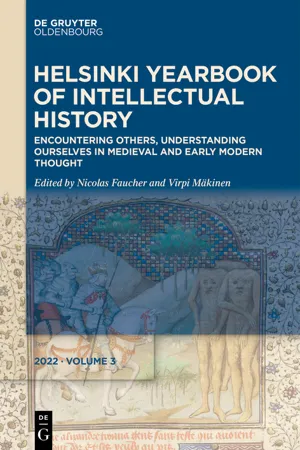
Encountering Others, Understanding Ourselves in Medieval and Early Modern Thought
- 297 pages
- English
- ePUB (mobile friendly)
- Available on iOS & Android
Encountering Others, Understanding Ourselves in Medieval and Early Modern Thought
About this book
Recent research has challenged our view of the Abrahamic religious traditions as unilaterally intolerant and incapable of recognizing otherness in all its diversity and richness; but a diachronic and comparative study of how these traditions deal with otherness is yet to appear.
This volume aims to contribute to such a study by presenting different treatments of otherness in medieval and early modern thought. Part I: Altruism deals with attitudes and behaviors that benefit others, regardless of its motives. We deal with the social rights and emotions as well as the moral obligations that the very existence of other human beings, whatever their characteristics, creates for a community. Part II: Religious recognition and toleration considers identity, toleration and mutual recognition created by the existence of religious or ethnic otherness in a given social, religious or political community. Part III: Evil deals with religious otherness that is considered evil and rejected such as heretics and malevolent, demonic entities.
The volume will ultimately inform the reader on the nature of religious toleration (including beliefs and doctrines, even emotions) as well as of the self-definition of religious communities when encountering and defining otherness in different ways.
Frequently asked questions
- Essential is ideal for learners and professionals who enjoy exploring a wide range of subjects. Access the Essential Library with 800,000+ trusted titles and best-sellers across business, personal growth, and the humanities. Includes unlimited reading time and Standard Read Aloud voice.
- Complete: Perfect for advanced learners and researchers needing full, unrestricted access. Unlock 1.4M+ books across hundreds of subjects, including academic and specialized titles. The Complete Plan also includes advanced features like Premium Read Aloud and Research Assistant.
Please note we cannot support devices running on iOS 13 and Android 7 or earlier. Learn more about using the app.
Information
Table of contents
- Title Page
- Copyright
- Contents
- Introduction
- Part I: Evil
- Part II: Toleration
- Part III: Altruism
- Contributors
- Index